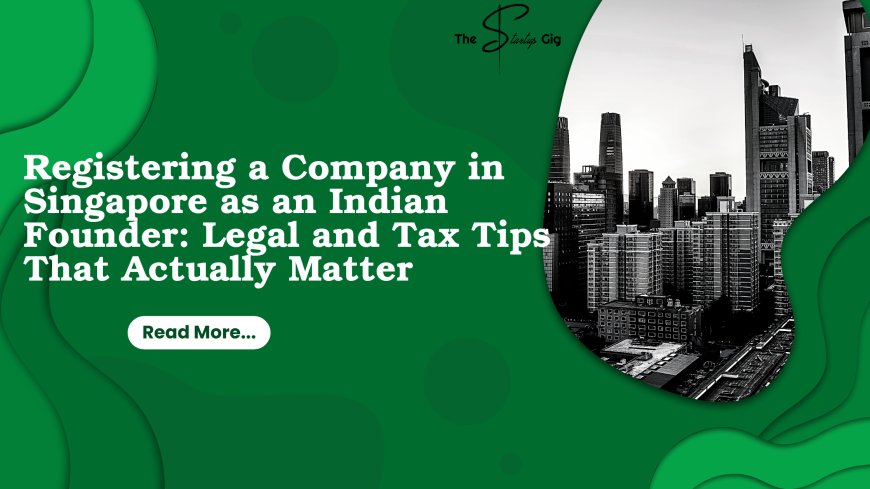Registering a Company in Singapore as an Indian Founder: Legal and Tax Tips That Actually Matter
Indian entrepreneur? Learn how to register a company in Singapore, plus key legal and tax tips that make the process smoother and smarter.

If you are an Indian founder exploring international markets, company registration in Singapore is probably already on your radar. And rightly so.
Singapore has become a top choice for Indian entrepreneurs who want a trusted global base, friendly tax laws, and straightforward compliance. Setting up a business there is fast, online, and investor-friendly.
But before you dive in, there are a few things you should know, especially around local rules, director requirements, and tax exposure. Lets walk through it.
Why Indian Founders Choose Company Registration in Singapore
There are some very real advantages to registering a company in Singapore if you are based in India.
-
You can own 100 percent of the company
-
You do not need to be physically present to get started
-
The entire process is digital and often takes less than a week
-
Singapore offers major tax exemptions for startups
-
Investors and clients see Singapore companies as credible and well-regulated
It is not about leaving India behind. It is about building a business that can scale globally without getting tied down in bureaucracy.
Can an Indian citizen complete company registration in Singapore?
Yes. Singapore allows full foreign ownership. As an Indian citizen, you can be the sole shareholder and director of your company.
However, there is one legal condition you must meet. Every company in Singapore must appoint at least one local director. This person needs to be a Singapore citizen, permanent resident, or someone holding a valid pass that allows them to act as a director.
If you do not know someone in Singapore who qualifies, you can use a nominee director service. This is common practice and fully legal, as long as the service is structured correctly with a clear agreement and liability protection.
Step-by-Step: How to Complete Company Registration in Singapore from India
Here is a straightforward breakdown of how the process works.
1. Reserve your company name
You submit the desired name to ACRA. It is approved as long as it is unique and follows naming guidelines.
2. Decide on your company structure
Most founders go with a Private Limited Company. This structure protects your personal assets, supports fundraising, and gives you access to Singapores tax benefits.
3. Appoint directors and shareholders
You must appoint at least one local director. You can also be a director and shareholder yourself. The company can have up to 50 shareholders.
4. Provide a local Singapore address
This will be your registered office address. You do not need to rent an office. Virtual address services are acceptable and widely used.
5. Submit your documents
You will need to prepare:
-
Passport and proof of address for all foreign directors and shareholders
-
Consent forms signed by all directors
-
A standard constitution (you can use the government template)
6. File for company registration in Singapore
Once submitted, ACRA usually completes the company registration within 1 to 3 business days.
What Happens After Company Registration in Singapore
Setting up your company is just the first step. Here is what comes next.
Open a corporate bank account
Some banks in Singapore require in-person verification. Others offer remote onboarding. If a local bank is too complex, consider global fintech platforms that accept Singapore companies.
Appoint a company secretary
This is legally required within six months of registration. The secretary must be a Singapore resident and cannot be the same person as the sole director.
Stay compliant
All Singapore companies must:
-
File annual returns with ACRA
-
Submit corporate tax returns to IRAS
-
Maintain accurate accounting and financial records
Most founders work with a corporate service provider to handle this.
Tax Tips for Indian Founders
If you are registering a company in Singapore from India, taxes will come into play sooner or later. Here are some things to consider.
1. Use Singapores startup tax exemption
New companies can claim:
-
75 percent tax exemption on the first $100,000 dollars of income
-
50 percent on the next 100,000 dollars
These apply for the first three years, provided your company qualifies.
2. Watch your tax residency status
Even if your company is registered in Singapore, if all decisions and operations happen in India, Indian tax authorities might consider it a resident company under Indian law. That could mean additional tax obligations.
Speak to a cross-border tax advisor who understands how Singapore and India treat foreign-sourced income.
3. Avoid creating a permanent establishment in India
If your Singapore company operates mainly out of India, signing contracts, running operations, servicing clients, Indian authorities might say you are effectively doing business in India and tax you accordingly.
To avoid this, keep some operations, strategic decisions, or team presence in Singapore. Build actual business substance, not just paperwork.
What You Need to Watch Out For
-
Do not go for the cheapest nominee director service. If something goes wrong, they carry legal liability, and so do you. Work with a provider that offers proper contracts and vetting.
-
Keep your compliance clean from day one. Missing filings or submitting poor records will cost you later.
-
Make sure your business has a real commercial reason to be in Singapore. Authorities can flag paper companies set up purely to save tax.
Final Thoughts
Company registration in Singapore is one of the fastest ways for Indian founders to go global. You can get set up in a few days, own the company completely, and access a world-class legal and financial ecosystem.
But the structure needs to be done properly. You need the right local director, clean paperwork, and smart tax planning. If you get those things right, you will have a powerful foundation for a startup that is built to scale.
Need help with company registration in Singapore from India
The Startup Gig helps Indian founders register fully compliant Singapore companies, with the right legal setup, a nominee director, and tax strategy. If you want to do it right the first time, reach out to our team.







































